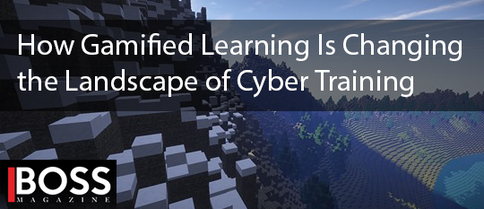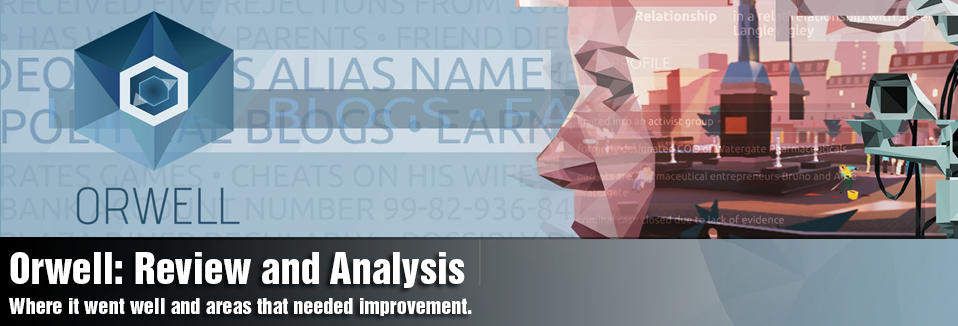|
|
Personal Projects
|
|
|
Orwell is a game developed by Osmotic Studio, which plays with the idea of social networking and the power of information. Much like the games I reviewed the blog post “Implied Knowledge”, Orwell is a game that heavily leverages the player’s understanding of social media and application norms. In today’s post I’ll be exploring Orwell and elements of the game that were very strong, as well as areas that could have been improved. If you haven’t played and would like to, I’d stop reading here… from here on out we’ll be entering some heavy spoiler territory. The premise of Orwell is that you’re a recruit trying out a new type of surveillance software called Orwell. Your job is to use Orwell to investigate suspects of a terrorist bombings in a place called “The Nation.” Orwell allows you to snoop on these individuals, find data fragments, and add these to the suspect’s file. The key point of the game is that you can choose what elements you add to the file, and what to not include. There are times where pieces of information could be out of context and paint the individual in a false light. The main way Orwell allows the players to gather this information is either through web based searches (finding user profiles and social media), listening in to phone calls and chat logs, and in some cases you’re able to hack into their phones and computer files. Orwell is also an episodic game, releasing itself once a week over the course of five weeks. Orwell is truly master of the user experience. If there’s anything that could be said about this game, it’s that it knows how to present itself. Upon first entering the game, there’s a really convincing boot sequence where the player is praised for being the first applicant, and they have to agree to a fake terms of use. There’s a lot emphasis on how your choices have big impacts to the game. As you drag data fragments onto case files there’s warnings, telling the player that what they are about to do cannot be undone, etc. Overall I found the interface and communication to the player to be very rewarding. I felt like a new recruit working with this strange new surveillance software, I was pretty invested early on. They go a step further to even have a character from the game e-mail you when the next episode is ready, asking for you to return to work. While the writing is well done and overall presentation is superb, there are a few things mechanically that I felt made this game lacking. It was interesting to have data fragments be highlighted information, that the player drags and drop to collect, but in doing so the player can quickly adopt the habit of skimming through the information in search of the highlighted areas. Perhaps this was intentional because there’s a lot of reading material, but it made so much of what the player is doing feel unimportant… which was contradictory to the story’s message. I remember in the first episode I was really paranoid about what I was doing, because of all of the messages telling me how strongly I was impacting people’s lives, and yet in later episodes I felt very disconnected. To be fair I think the episode frequency also negatively impacted the experience. At first I thought it was a cool idea to have this be released weekly, but I quickly found myself falling out of the game’s rhythm. Orwell didn’t have a strong enough story to keep me invested for that long. In game time, the story plays out in a matter of days… It would have been more interesting for the game to be released daily, sort of like your character attending their first week at work. Mr. Robot had the me wait as well, but the game only ever had me waiting for 8 to 12 hours at most. Another element that I felt was lacking from Orwell was a real sense of involvement. In other games like Mr. Robot, or even Her Story, I felt much more part of the experience. Orwell was much more of a voyeur experience. While Orwell offered more depth and variety of tools than it’s competitors, the fact that the players couldn’t truly participate in what was happening made the player really feel more removed from the experience. In many ways Orwell over compensated for this by engaging the player in different ways, i.e. the out of game e-mails. Yet overall I still was left wishing I could actually communicate with the people I was stalking or maybe even able to enter a “search” query into the database, sort of like Her Story. I was pretty surprised to find the final chapter of Orwell to be the strongest for me. Orwell was able to bring back the pressure I felt in the first episode by introducing a new mechanic where the player is limited to the amount of data fragments they could collect. There’s literally a count down in the final episode, and it forces the player to really care about their choices and sift through the information… think critically… and choose which information was relevant. This really brought the game back for me, and made the player’s choices feel impactful. Overall Orwell is still a superb experience and I think adds quite a bit to the recent trends of games using social media as part of a way to tell it’s story. Orwell will certainly be praised for it’s social commentary of “Big Brother” and the dangers of social media. For me this still feels very much like an experimental game and if you’re interested in that sort of thing, definitely check it out! Although I will say that I still yearn for a similar experience to the Mr. Robot app…
0 Comments
Leave a Reply. |
AuthorI make games, I play games... and sometimes I have some thoughts about that. Archives
March 2024
|
Proudly powered by Weebly














 RSS Feed
RSS Feed